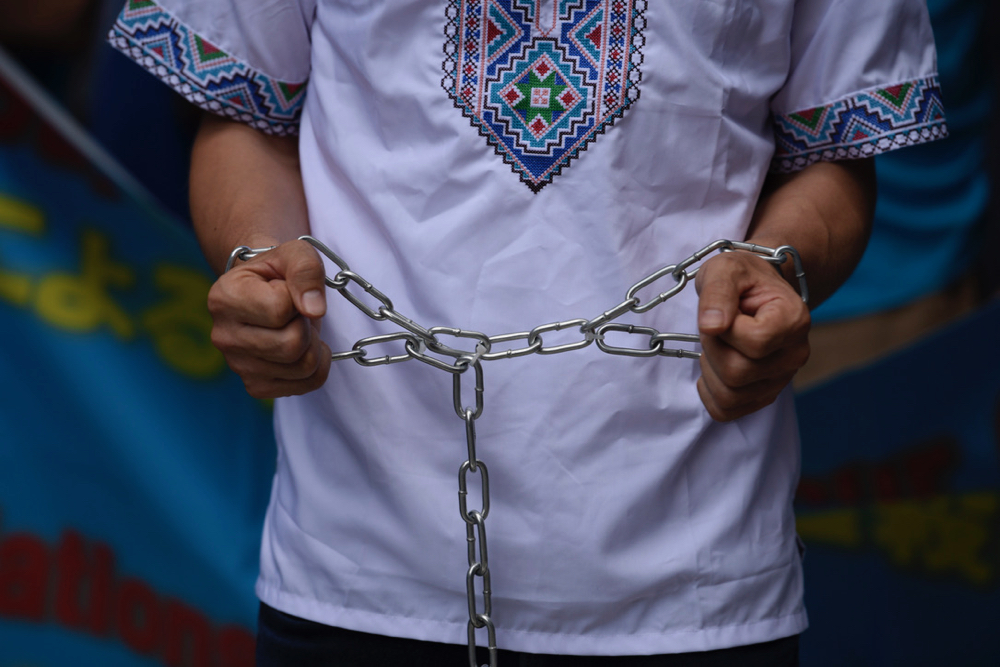The Chinese Communist Party has affirmed its determination to control religion by issuing new translations and interpretations of “classic” religious works.
The aim is to provide a state-ordained basis for spiritual life.
The move signals a profound shift in the Communist Party’s approach to religion, where it is moving from political management to uncompromising constraint.
Its new line calls for "a religious ideological system with Chinese characteristics".
It is a signal that the government of Xi Jinping intends to double down on ideology as it attacks democracy campaigners in Hong Kong, conducts the mass detention of Muslims in the far western region of Xinjiang and continues relentlessly its struggle to wear down resistance by Tibetan Buddhists loyal to the Dalai Lama.
Recent propaganda has characterised all of them as instruments of hostile foreign powers intent on starting “colour revolutions” and fomenting “terrorism” designed to halt the rise of China and to split the Chinese state.
Chinese leaders explicitly link calls for religious and political freedom to strategic challenges, ranging from American trade tariffs to a general pushback against their expansion of military and diplomatic power around the world.
The strengthening of the Communist Party line has been foreshadowed by a sequence of articles in its leading theoretical journal, which is, without irony, entitled Quishi, or “Seeking Truth”.
It follows the introduction of new religious regulations in 2018 which tightened state control, curbed freedom of worship and rolled back four decades of increasing tolerance by the officially atheist regime.
The party revealed its plans to “re-evaluate” religious texts at a symposium of cadres and sixteen religious figures on 26 November which was reported in a dispatch by the official Xinhua news agency.
Xinhua said the gathering was presided over by Wang Yang, a member of the seven-man Politburo standing committee, the supreme ruling body in China.
Wang called for a “comprehensive evaluation of the existing religious classics aiming at contents which do not conform to the progress of the times, such as the annotation, revision and re-translation”.
The agency said: "It is necessary to organise the forces of religious circles and academic circles to systematically study the thoughts of various religions, and to make accurate and authoritative interpretations of the classical doctrines in order to effectively resist the erosion of extreme thoughts and heresy."
Chinese security officials have hitherto concentrated on promoting a “correct” interpretation of Islamic texts but it was notable that photographs of the event showed unidentified figures of different faiths, all in suitable religious garb, around an oval table.
Wang is 64 and has been thought of as a reformer. He was once the Communist Party chief in Guangdong Province, the modernising industrial powerhouse which borders Hong Kong. His role at the meeting suggests that the party has found unity in its resolve to defeat any opposition to its rule.
Bill Bishop, a China analyst based in Washington DC, called it “another reminder that the party sees itself above all deities”.
Although little-noticed in the West, reports of the symposium were widely read in Hong Kong, where Christians play prominent roles in political life on both sides of the current divide.
The prospect that state-authorised religious texts may be imposed on the Chinese mainland will reinvigorate people determined to defend Hong Kong’s liberties under the “one country two systems” formula against what what one academic has called "an authoritarian project based on a psychology of totalitarianism".
That analysis, unfashionable during the optimistic era of globalisation, has been convincingly made by John Garnaut, an Australian sinologist, writer and former adviser to the government in Canberra.
Garnaut traces the roots of Xi Jinping’s project to Joseph Stalin, identifying its key text as Stalin’s 1938 bible,A Short Course on the History of the Bolsheviks. This is neither short, nor historical, and indeed, by Chinese standards, it sold only a paltry 40 million copies. But it is a handy manual for dictatorship by incessant purges and struggle, while Xi has paid tribute to Stalin by quoting his description of writers as “engineers of the human soul.”
One presumes, therefore, that this is one classic which will not require revision.
Michael Sheridan is writing a history of Hong Kong



 Loading ...
Loading ...